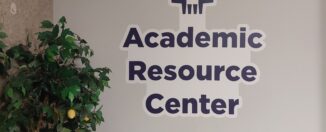How Concordia Chooses Resident Assistants
By Benjamin Gordon
Every spring, Concordia faculty gear up for another round of hiring resident assistants. The resident assistants on campus have had some sort of effect on every student throughout their time at Concordia. Many wish to be part of this ministry opportunity, but only a few are selected each year.
The basic process for applying to be an RA consists of an application, situation stations and an interview.
According to Director of Student Development Rehema Kavugha, the decision process is not taken lightly.
“It is first and foremost a ministry, so we spend a lot of time praying about it,” Kavugha said.
Kavugha explained the whole process takes a very intense six weeks, which she compared to feeling like six months. Kavugha also said that, compared to other universities, Concordia has a bigger body of RAs and a more intensive RA vetting process.
The process begins every spring with an orientation meeting that is separated between genders. This meeting is designed to explore the option of becoming an RA with a panel of current RAg present to share their experiences and answer questions.
RA candidates can then submit an application after the meeting. This involves a number of questions about the applicant requires letters of recommendation from two friends. Candidates must also submit several evaluation forms that are filled out by the prospective RA’s advisor or FYE teacher for freshmen, the student’s current RA, and a professor of their choice.
Kavugha says some factors that influence acceptance include faculty evaluations, prior knowledge of the person, and letters of recommendation from peers.
“Pick two friends that you know are going to say good things about you,” Kavugha said.
After the applications are submitted, the number of applicants is reduced to 60. The remaining 60 will go on to simulation stations which will put the prospective RAs in simulated situations that they will encounter if they are selected. This tests their ability to react to situations requiring disciplinary action, conflict resolution and peer ministry opportunities. The situations are acted out by current RAs and resident coordinations (RCs). Whether an applicant gets past this stage is determined by a point system that is used to grade them on each situation.
Out of the 60 applicants that go into the simulation stations, only 40 will be selected to move on to the interview process. The interview process is split into two 15-minute blocks. The first one is done by two current staff members and the second one is done by Kavugha, Vice President for Student Athletics and Affairs Gene Brooks, and the four current RCs. RA candidates generally complete the interviews in pairs. The first part is more about the role of being an RA, and the second part looks more into the motivations and intentions of the candidate as well as potential commitment conflicts that could arise.
A week or two later during spring break, the deliberation will begin to determine who out of the 40 remaining RA applicants will become RAs. At this time, current RA’s will be considered for rehiring based on the RA student survey, a self-evaluation, and an RC evaluation. The decision is ultimately made by Kavugha, Brooks, and the RCs.
Kavugha said that some considerations that go into the hiring process are the current need and whether a potential RA is a good fit for the team.
“Oftentimes we sit in a room a long time, talking through and poring over it,” Kavugha said.
After RAs are selected they, will attend their first meeting, which Kavugha says is one of the highlights of her year. When an RA is selected Kavugha said some of the perks they receive include great ministry opportunities and a free room for the next academic year.














